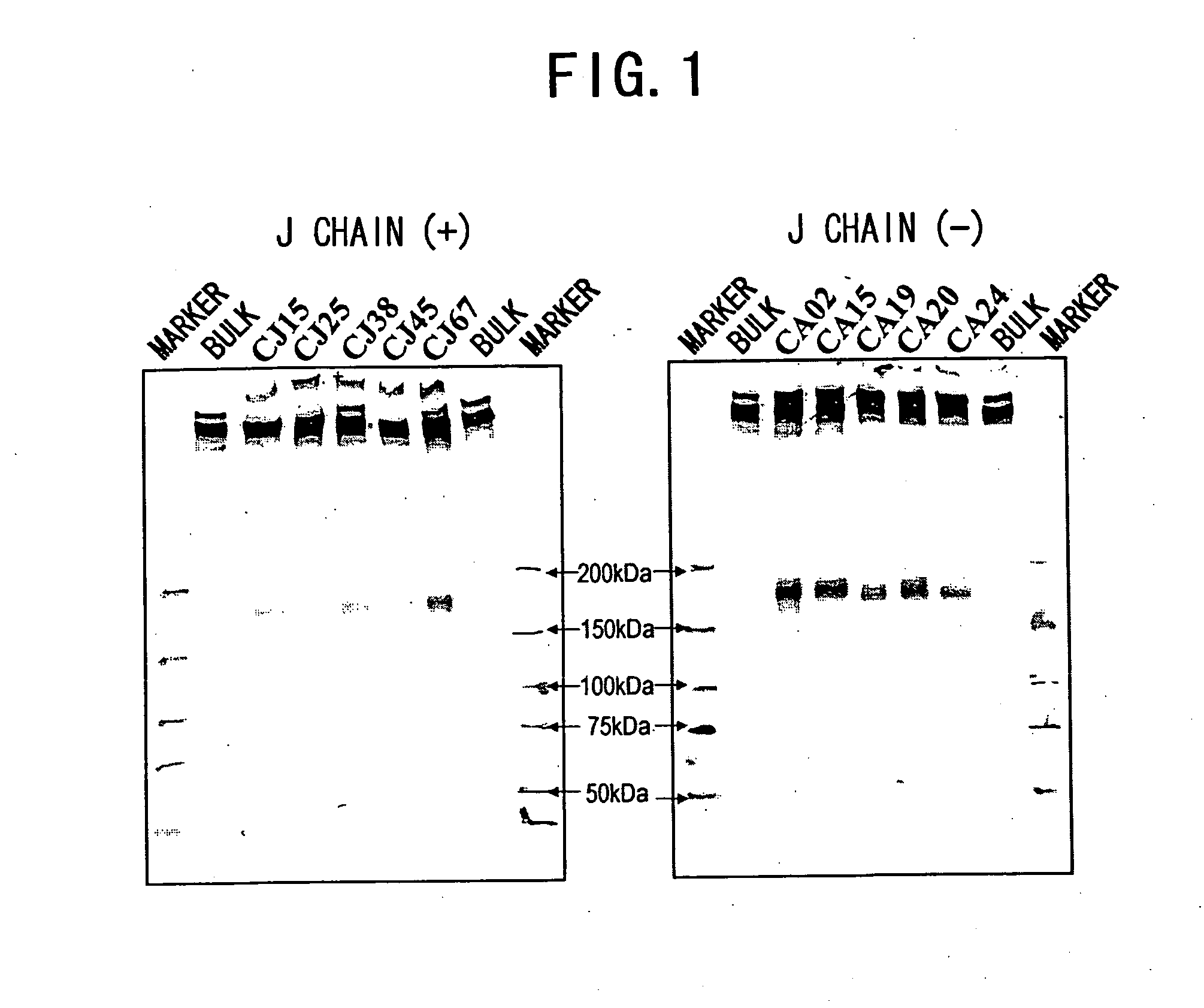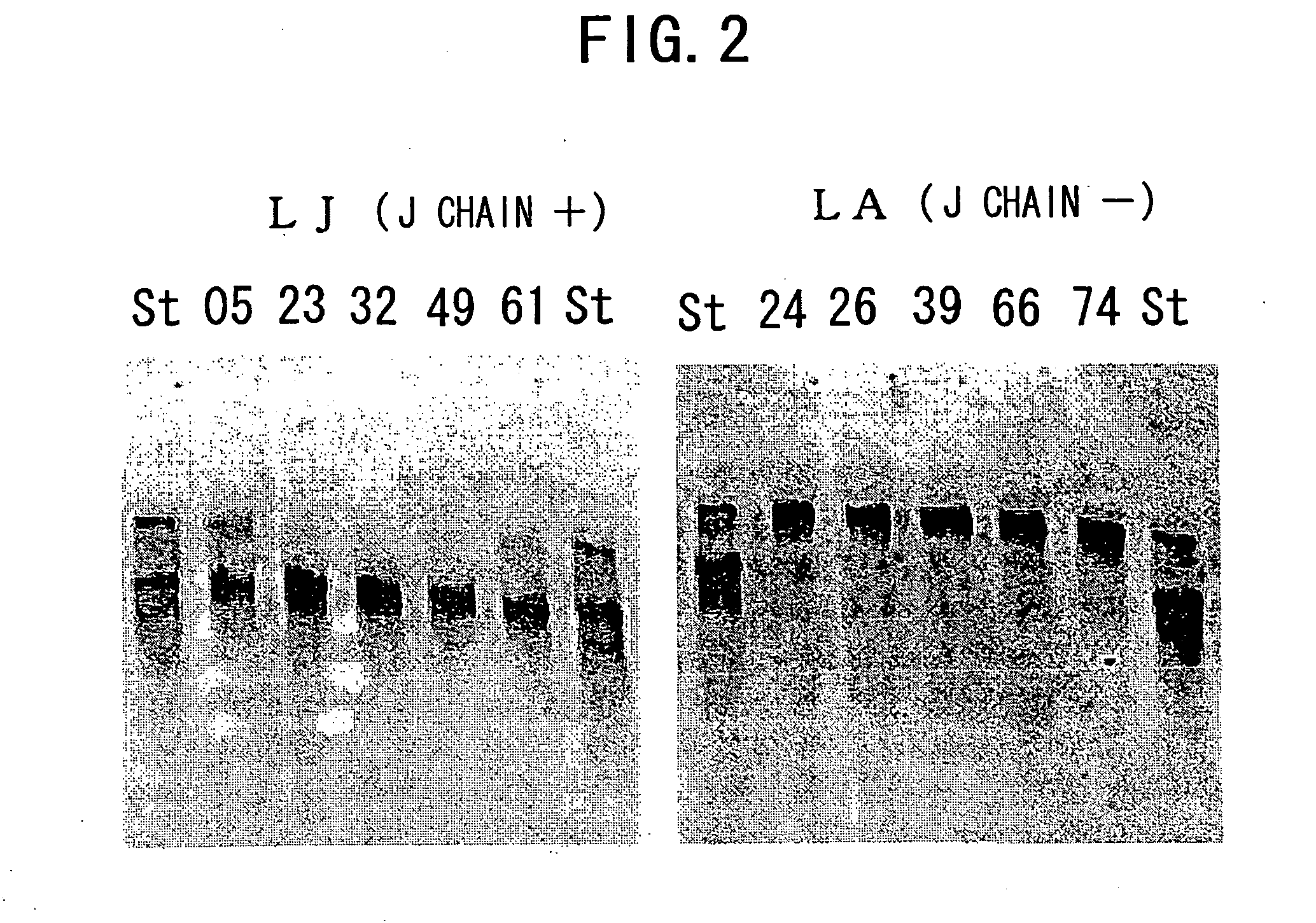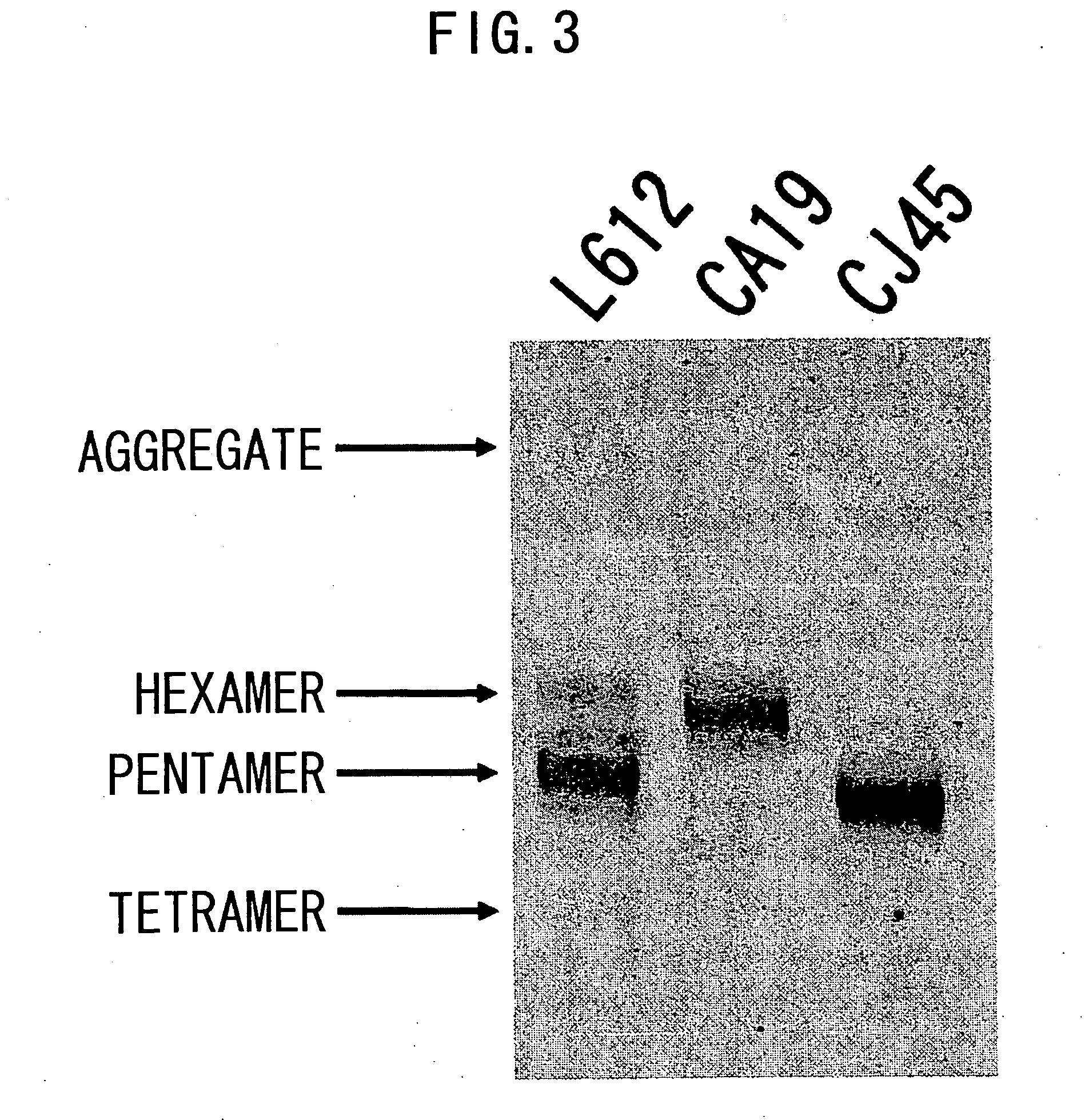IGM production by transformed cells and methods of quantifying said IgM production
a technology of transformed cells and igm, which is applied in the field of igm production, can solve the problems of difficult to obtain a large amount of igm pentamer or hexamer components from these lymphoid cell lines, and no established techniques enable the construction of polymeric structures in recombinants, so as to improve the efficacy and safety of igm, and facilitate culture. , the effect of increasing the activity of igm
- Summary
- Abstract
- Description
- Claims
- Application Information
AI Technical Summary
Benefits of technology
Problems solved by technology
Method used
Image
Examples
example 1
Preparation of Recombinant L612 Human Antibody to Ganglioside GM3
1.1 Construction of an Anti-ganglioside GM3 Human Antibody H Chain Gene
[0275] A gene encoding an H chain of a human antibody binding to ganglioside GM3 (hereinafter referred to as L612) was amplified by RT-PCR using total RNA extracted from human B cells transformed with Epstein-Barr virus (hereinafter referred to as L612-expressing B cells). A nucleotide sequence of an H chain variable region gene of L612 has been reported by Hoon et al. (Cancer Research 1993; 53:5244-5250).
[0276] Total RNA was extracted from 1×107 L612-expressing B cells using RNeasy Plant Mini Kits (QIAGEN). Based on the nucleotide sequence of the IgM H chain constant region, two oligonucleotides (LMH-f3, LMH-r3) were designed. LMH-f3 (SEQ ID NO: 7) and LMH-r3 (SEQ ID NO: 8) were synthesized in sense and antisense directions, respectively.
[0277] The 5′- and 3′-cDNA fragments were separately amplified with 1 μg total RNA by SMART RACE cDNAAmplif...
example 2
Preparation of Recombinant Human Antibody L55 to Ganglioside GM2
2.1 Construction of an Anti-ganglioside GM2 Human Antibody H Chain Gene
[0396] A gene encoding an H chain of a human antibody (hereinafter referred to as L55) which binds to the ganglioside GM2 was amplified by RT-PCR using total RNA extracted from human B cells (hereinafter referred to as L55-expressing B cells) transformed with Epstein-Barr virus. A nucleotide sequence of an L55 H chain variable region gene has been reported by Nishinaka et al. (Immunogenetics 1998; 48: 73-75).
[0397] Total RNA was extracted from 1×107 L55-expressing cells using RNeasy Plant Mini Kits (QIAGEN). Based on the nucleotide sequence of the IgM H chain constant region, two oligonucleotides (LMH-f3, LMH-r3) were designed. LMH-f3 (SEQ ID NO: 7) was synthesized in the sense direction and LMH-r3 (SEQ ID NO: 8) in the antisense direction.
[0398] With 1 μg of total RNA, 5′- and 3′-side gene fragments were separately amplified using SMART RACE cD...
example 3
3.1 Analysis of Polymerization of Recombinant L612 (Example 1) and Recombinant L55 (Example 2)
[0485] The recombinant L612 (Example 1) and recombinant L55 polymers were analyzed using non-reducing SDS-PAGE. The electrophoresis gel for non-reducing SDS-PAGE was prepared in the manner described below. 1.80 mL of 30% acrylamide (C%=3.33%), 3.75 mL of 1.50 M Tris-HCl (pH8.8), 3.39 mL of milli Q water, and 2.25 mL of glycerol were admixed in a vessel designed for HYBRID MIXER (TOMY), and the resulting solution was kept at 50° C. Then, 3.75 mL of 2.0% agarose was added and the mixture was kept at 50° C. again.
[0486] Then, the mixture was left to stand at room temperature for one minute, 12 μL of TEMED and 50 μL of 25% ammonium persulfate (APS) were added thereto, followed by stirring in HYBRID MIXER (TOMY) for 15 seconds, and degassing for 15 seconds. The solution was collected using a disposable syringe, poured into a gel plate, and acrylamide was allowed to polymerize at 37° C. for one...
PUM
| Property | Measurement | Unit |
|---|---|---|
| temperature | aaaaa | aaaaa |
| pharmaceutical composition | aaaaa | aaaaa |
| temperature | aaaaa | aaaaa |
Abstract
Description
Claims
Application Information
 Login to View More
Login to View More - R&D
- Intellectual Property
- Life Sciences
- Materials
- Tech Scout
- Unparalleled Data Quality
- Higher Quality Content
- 60% Fewer Hallucinations
Browse by: Latest US Patents, China's latest patents, Technical Efficacy Thesaurus, Application Domain, Technology Topic, Popular Technical Reports.
© 2025 PatSnap. All rights reserved.Legal|Privacy policy|Modern Slavery Act Transparency Statement|Sitemap|About US| Contact US: help@patsnap.com



